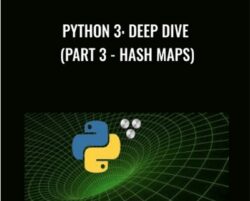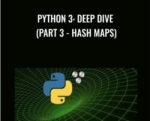What you’ll learnAssociative ArraysHash Tables and Hash FunctionsPython’s implementation of hash tablesDictionaries and SetsDefining hash functions for our custom classes and why that is usefulCreating customized dictionaries using the UserDict classdefaultdictOrderedDict and Python3.6+ equivalencesCounter (multi-sets)ChainMapSerialization and DeserializationJSON serialization/deserializationIntro to JSONSchema, Marshmallow, PyYaml and Serpy 3rd party librariesCourse content+Introduction+Associative Arrays – Theory!+Dictionaries+Coding Exercises+Sets+Project 1+Serialization and Deserialization+Coding Exercises+Specialized Dictionaries+Coding ExercisesRequirementsThis is an advanced course, so a solid Python foundation is necessaryJupyter Notebooksfunctional programming (zip, map, sorted, any, all, etc)lambdas, closures and decoratorsbuilt-in decorators such as @lru_cache, @singledispatch and @wrapsiterables, iterators, generators and context managersvariable scopes and namespaces (globals, locals, etc)ability to install 3rd party libraries (e.g. pip install)This course is an in-depth look at Python dictionaries.Dictionaries are ubiquitous in Python. Classes are essentially dictionaries, modules are dictionaries, namespaces are dictionaries, sets are dictionaries and many more.In this course we’ll take an in-depth look at:associative arrays and how they can be implemented using hash mapshash functions and how we can leverage them for our own custom classesPython dictionaries and sets and the various operations we can perform with themspecialized dictionary structures such as OrderedDict and how it relates to the built-in Python3.6+ dictPython’s implementation of multi-sets, the Counter classthe ChainMap classhow to create custom dictionaries by inheriting from the UserDict classhow to serialize and deserialize dictionaries to JSONthe use of schemas in custom JSON deserializationa brief introduction to some useful libraries such as JSONSchema, Marshmallow, PyYaml and Serpy ***** Prerequisites *****Please note that this is a relatively advanced Python course, and a strong knowledge of some topics in Python is required. Beyond the basics of Python (loops, conditional statements, exception handling, built-in data types, creating classes, etc), you should also have an in-depth understanding of the following topics:functions and functional programming (recursion, *args, **kwargs, zip, map, sorted, any, all, etc)lambdas, closures and decorators (including standard decorators such as @singledispatch, @wraps, etc)iterables, iterators, generators and context managersnamed tuplesvariable scopes and namespaces (globals, locals, etc)For this course you will also need to install some 3rd party libraries, so you need to be comfortable with doing this using the tool of your choice (e.g. pip, conda, etc)Finally, most of the code in this course is illustrated using the freely available Jupyter Notebooks, so you will need that as well.Who this course is for:Python developers who want a deeper understanding of Python dictionaries and related topicsGet Python 3: Deep Dive (Part 3 – Hash Maps) – Fred Baptiste, Only Price $42Tag: Python 3: Deep Dive (Part 3 – Hash Maps) – Fred Baptiste Review. Python 3: Deep Dive (Part 3 – Hash Maps) – Fred Baptiste download. Python 3: Deep Dive (Part 3 – Hash Maps) – Fred Baptiste discount.
 The Micro Wholesaling Training – Rob Swanson
₹8,300.00
The Micro Wholesaling Training – Rob Swanson
₹8,300.00
 Steven Conway – 99% of your Medicare Questions… Answered
₹3,320.00
Steven Conway – 99% of your Medicare Questions… Answered
₹3,320.00
Python 3: Deep Dive (Part 3 – Hash Maps) – Fred Baptiste
₹6,308.00




